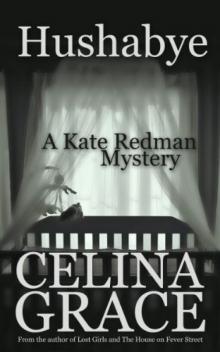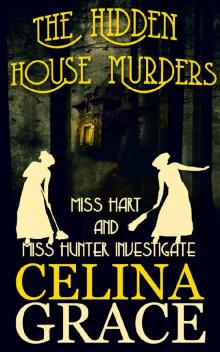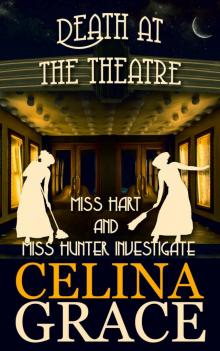- Home
- Celina Grace
The Asharton Manor Mysteries Boxed Set (Books 1 - 4)
The Asharton Manor Mysteries Boxed Set (Books 1 - 4) Read online
The Asharton Manor Mysteries
Death at the Manor (1929)
Celina Grace
I’d never seen anything like that house before in my life. Even using the word ‘house’ doesn’t sound right; it doesn’t convey the impression I want. I started off as a kitchen maid in one of the townhouses in Brighton and I’d thought they were grand enough, but they look like the meanest, dingiest old hovels compared to Asharton Manor. It was like Buckingham Palace, I’m telling you; the grandest place I’d ever set eyes on or foot in. They’d sent a car to meet me at the station. It was only about the third time I’d ever been in a car, and I was still recovering from the novelty when I had the shock of seeing the manor for the first time. As the car rattled up the driveway, I looked out of the window and I could feel my eyes becoming rounder and my mouth doing the same. It was four stories of golden stone, the drive sweeping around the front of it; a fountain shot upwards before it, so that the front door could only be seen through a mist of silver droplets. The front seemed to have hundreds of windows and they all glittered in the sun. They gave the place a blank, closed-in look. Although impressive, it wasn’t a welcoming house.
We drove on past the front door, of course, round the back to the stables and the servants’ quarters. The driver hadn’t said one word to me, apart from addressing me at the station: “Car for Miss Joan Hart, that you?” Perhaps he was a bit put out to have been sent for someone so lowly. It was a step up for me, getting this job here, head kitchen maid, but unless you’re the butler or the housekeeper, you’re never going to get much respect from the rest of the servants. I didn’t let it bother me. I was still too astonished that I was going to be living here, in a house like something you might see in films. Asharton Manor. It was a queer name. It didn’t seem to belong to the village, which was called Midford, about twenty miles west from Chippenham. I hadn’t been to this part of the country before – all my places beforehand had been in cities and my previous position had been in London. I wondered what it would be like, living in the country.
I wasn’t able to wonder much further as, by that time, I was in the kitchen, trying not to wilt before the stares of the other kitchen staff. It was a big, low-ceilinged place, with stone flags on the floor and the biggest kitchen range I’d ever seen on one side. I sighed inwardly as I thought about how long it would take to black-lead, but then brightened a little when I realised that it probably wouldn’t be my job anymore. Here, I hoped I would learn some proper cooking.
The cook came over and introduced herself to me as Mrs. Cotting. In all the places I’ve worked, the cooks have either been thin or stout. It’s funny, but there never seemed to be any cook that was in the middle, size-wise. The thin ones had given up on eating – cooking does that sometimes, it robs you of your appetite – and the fat ones had sampled too many of their own dishes. Mrs. Cotting was a thin cook and she had a sharp, shrewish kind of face that I didn’t much like. But, I must say, she shook hands quite cordially, although her glance at me was frankly assessing.
“You look strong enough, gel,” was her opening remark and I nodded. I am strong, I’ve been a woman’s size and shape since I was eleven years old and my ‘heftiness’ was what won me the first job I ever had. It was a shame that my face was so homely, not that a skivvie’s uniform was ever very flattering. You weren’t supposed to have a bit of hair showing under your cap and mine is the sort of face that could do with a bit of framing.
“You’re in at the deep end, tonight,” Mrs. Cotting said brusquely. “We’ve got a welcome back dinner for the mistress’s brother, so that’s eighteen sitting down to table.”
I quailed a little inwardly but managed to nod firmly, as if that were going to be no bother at all.
“You’ll want to see your room,” said the housekeeper, Mrs. Smith. I’d met her once before, at my interview. She was a big but graceful woman, with a no-nonsense Irish brogue. “You’ll be sharing with Annie, the under housemaid.”
She beckoned to Annie, who was a shy looking girl with smooth brown hair. She looked nice enough and I was glad.
“Take Joan to her room, Annie, and get her settled. Joan, Mrs. Cotting will want you back down here in half an hour. Do you know how to set up a table?”
“Yes, of course,” I said, slightly snappishly. I mean, honestly. That was one of the first things I learned on the job. Mrs. Smith frowned a little and I dropped my eyes, chastised, and bobbed an apologetic little curtsey. I didn’t want to start off on the wrong foot straight away.
Annie and I climbed the back stairs to our room, which was one of the small ones located up in under the eaves. Later, I was able to climb the main staircase, which was very grand, but the servants’ staircase was shabby and didn’t even have carpet, just scuffed linoleum.
We climbed the stairs for what seemed like hours. Luckily my trunk wasn’t heavy – it wasn’t as if I owned a lot of things.
“You’re from London, aren’t you?” Annie asked, shyly.
“Yes.”
“Do you get to see the films much there?”
I blinked. “Um… sometimes.”
“I love the talkies,” said Annie. “We don’t have a theatre anywhere near here, worst luck. Bristol’s the nearest and that’s such a long way away it takes up all your day off. Must be lovely to live in London.”
“Well,” I said, a little helplessly. “I suppose so.”
“Ramón Novarro’s my favourite,” said Annie. “Who’s yours?”
“Um…” I said again, but was saved from replying by the fact that we’d finally reached the top of the stairs. Puffing, we both came out into a dark little corridor, with several doors leading off it. The ceiling was low enough for me to cringe a little and duck my head.
“Down here,” said Annie and led me through the last door along the corridor. Our room was a typical one; whitewashed walls, no paint or wallpaper here. Iron bedsteads along the wall, each with a lumpy mattress made up with the cast-off bedding of the better portions of the house. A washstand stood on a little wooden table between the beds and a small, battered looking wardrobe leaned against the wall. I could tell which bed was Annie’s – the wall beside it was plastered with pictures of Novarro and other movie stars, obviously torn out of various film magazines. It made me smile a little inside.
I was never much one for the talkies; I preferred the music halls. My friend Verity and I used to go as often as we could afford it. Verity’s family had had connections with the theatre and sometimes we would be able to get free tickets and even get to go backstage to meet the performers. That was a real thrill. I felt a surge of loneliness when I realised Verity was now hundreds of miles away. I made up my mind to write to her as soon as I got a moment to myself.
Annie cast herself onto her bed, which creaked like a ship in a gale. I knew mine would be the same. I heaved my trunk onto the bedspread – yes, a jangle of springs like a pair of clashing cymbals – and began to unpack.
“We’ve got someone almost as good as a film star here at the moment,” said Annie after a moment, giggling. “Madam’s brother. You should see him, he’s so good looking.”
“Oh yes?” I said, trying to sound interested.
“He only came back from Africa about two weeks ago.” She pronounced ‘Africa’ in an awed tone. “He’s been living out there for years. You should see how brown he is. Brown as a berry!”
That phase has always struck me as rather foolish. I can’t think of any berries that are actually brown. I smiled politely and then thought, well, at least I can find out a bit more about the people I’m going to work for.
“What
’s the mistress like?” I asked, genuinely curious.
Annie pulled a face. “She’s a pain. Always moaning about her health and wanting different things and then not wanting them when she gets them.”
“Is she unwell, then?”
Annie rolled her eyes. “Thinks she is. Always taking to her bed for one thing or another.”
My heart sank. That meant a lot of cooking different dishes to try and ‘tempt an invalid’s palate’. Still, Mrs. Cotting had no doubt been here a while, she probably had Madam well managed. I hoped so.
Annie chatted on. “Then there’s Miss Cleo, the mistress’s best friend. She’s staying here for the summer. Very glamorous, she is, looks just like Louise Brooks. She’s an Honourable.” She stumbled a little over the syllables. I tried to look impressed.
“And the master?”
“He’s all right. Quiet. Mostly he’s up in London during the week. His aunt lives here too - she’s a fussy old thing, always messing about with flowers. Mrs. Carter-Knox. Her and Madam don’t get on too well.”
“In what way?”
Annie giggled. “Mrs. Carter-Knox is always doing these big flower arrangements and Madam doesn’t like them. Calls them ‘vulgar’. I can’t see anything wrong with them, to be honest. I suppose they’re a bit big.”
I nodded. Flower arranging… I wanted to roll my eyes. Who had time to mess about with sticking flowers in a vase but a woman who had nothing else to do?
I didn’t actually see the mistress until she came down to the kitchen, two days later, to discuss menus with Mrs. Cotting. She was pretty, I’ll give her that; little and blonde and dainty, with her hair in lovely marcelled waves over her shapely head. She wore diamond earrings, so whenever she turned her head there was an answering sparkle that flashed from her ears. She was quite simply dressed, but you could tell that whatever she was wearing cost the absolute earth.
I stood respectfully by while she and Mrs. Cotting talked. I’ve worked in households where the cooking was on the plain side and I’ve worked in Jewish houses, where they had all sorts of outlandish dishes, but I realised, after listening to Madam, that here I would be cooking the fanciest, most messed-about, fashionable dishes you could have. I didn’t mind that, so much – it was always interesting to try something new and I’ve always liked a challenge. What I could have done without was Madam’s simpering little voice; a soft, flannelly sort of voice that, I was sure, could easily become shrewish.
Still, she wasn’t as such talking to me. She wafted out of the door after about twenty minutes and Mrs. Cotting beckoned me over.
“You can make a start on this sauce, Joan,” she said. “You’ll find everything you need in the larder and the cool box.”
They didn’t scrimp on the food at Asharton Manor, I’ll give them that. Every day we had deliveries of fresh meat, milk, cream and cheese and the fish man came around three times a week. That first night I was there we’d done six courses, starting with a savoury, a soup, a fish course, the main course—which was rack of lamb—followed by pudding, then cheese, fruit and coffee. It being my first day on the job and all that, what with the travelling I’d done and the worry of all the new faces and ways, it was a miracle I didn’t drop dead with exhaustion. But, as I’ve said before, I’m young and strong and managed to somehow get through it. Luckily that was the only entertaining they did that week; although as I worked there, I grew to realise that they liked to entertain a lot.
I didn’t see the mistress or the master, the brother or anyone else the day after the dinner party. Sleeping off all the wine and cocktails and brandy they’d consumed, no doubt. Mrs. Cotting had gone to bed at midnight but I’d had to stay up ‘til one o’clock to get the kitchen shipshape. Annie was a vague snoring shape in the other bed by the time I’d stumbled up the stairs to our room. I didn’t even wash, I was so tired; I just stripped off my clothes and rolled into bed. One thing hard work does for you, it gives you a good sleep. I didn’t stir until Annie woke me at six thirty the next morning and, even though I’d barely had six hours sleep, I felt quite sprightly again and eager to make a start.
One morning after I’d been there a week, I was walking back to the kitchen door, my feet crunching over the gravel, when a man rounded the corner. I knew immediately who it was – the mistress’s brother. He had a shotgun slung over one shoulder and an old felt hat pushed back on his head. I saw what Annie had meant. He was very good looking, fair hair greased back but with a lock that fell over one eye. You could see the resemblance to the mistress, something in the chin and the cheekbones, but he didn’t have her fair skin. He looked like a polished bronze statue, he was so brown.
“Hello,” he greeted me. “I don’t believe we’ve met before.”
I could feel myself flushing red as a beetroot. Why was he talking to me, when he could clearly see by my uniform that I was a servant?
“I’m John Manfield,” he went on, easy as you like. “You must be Joan. Did you do those delicious little pork things at the dinner the other night?”
I managed to pull myself together and nod. After a moment, I came to my senses and curtseyed.
“Oh, don’t bother about that,” Mr. Manfield said, hefting his rifle onto the other broad shoulder. “Can’t stand the stuffiness of this country, sometimes. Not like this in Africa. Well, I’d better get on.”
He tipped his felt hat to me – I felt my cheeks go scarlet once more – and sauntered off. I was so flustered I found myself walking into the dairy rather than the kitchen and had to turn myself about and retrace my steps.
“Oh, he’s always like that,” Mrs. Cotting said a little later, when I had to explain why I’d messed up the mayonnaise. I was still a bit flustered at being talked to as a, well, an ordinary person, by a member of the gentry.
“He’s used to native servants,” Mrs. Cotting went on. “He’s always talking to us if he comes across us. Makes the mistress mad but he just shrugs it off.”
“He’s got an eye for the girls, too,” said Meg, the little kitchen maid, with a giggle.
“That will do, Margaret,” said Mrs. Cotting sharply. “Don’t be forgetting your place, now.”
“Sorry,” Meg said, abashed. We bent to our work again but, after a moment, I caught her eye and winked, and she stifled another giggle.
Miss Cleo was dark as the mistress was fair, with a clever face and a very drawling, sardonic voice, a complete contrast to Madam. She came down with her to the kitchen one day, dressed in her cream satin house-pyjamas, if you please, and wafted about, sticking her face into the larder and lifting up lids on the saucepans on the Rayburn, bold as brass. All the while, she smoked a cigarette in a long, ebony holder. I thought Mrs. Cotting was going to have a fit. It would have been funny, if I hadn’t known I’d be the one to have to deal with the aftermath. Of course, Mrs. Cotting would never have said anything to Cleo Maddox’s face – she had a title, after all. Instead, Mrs. Cotting would vent her anger on Meg and me.
I quite often saw Miss Cleo in the garden; swimming in the pool, playing tennis with Mr. Manfield or sometimes Mr. Denford. Annie told me, in a scandalised tone, that she had been seen down at the river one dawn morning, swimming with nothing on. She was the talk of the village, apparently, but it didn’t seem to bother her. The rich are like that, though; things that would bury someone of the working class merely slid off them like oil. She seemed a bit of an odd friend for the mistress to have, to be honest. They were so different, both in looks and in manner, but again, perhaps it’s different for those with money. They like to be with people like themselves.
The master himself was very different to both his wife and her brother. He was a stockbroker, whatever that was, and he was a thin, short man with very black hair and a neatly trimmed moustache. According to Violet, the lady’s maid, he was soft-spoken, gentlemanlike in his manners, and quiet.
“He’s always struck me as a bit lonely,” she said one evening, when we were talking in the servants’ hall. “Doesn’t s
eem to talk to the mistress much, or she doesn’t talk to him. Been even more like that since her brother came back and now Miss Cleo is here.”
“Wasn’t that how they met?” said Annie. She was smoking a cigarette which she’d cadged from Albert, one of the stable boys, and I was trying not to cough.
Violet nodded. “Mister John introduced them, out on his ranch in Africa. The master was a friend of his, Mister John’s.”
“I’d like to go to Africa,” I said, not really thinking.
Violet snorted. “Catch you saving up enough to go to Africa,” she said, laughing. “Honestly, Joan.”
I smiled dutifully at my supposed silliness, but I was aware of a spurt of anger. Why shouldn’t I go to Africa? Wasn’t I allowed to dream? The trouble with Violet, and with all the girls I knew except for Verity, is that their dreams were so small. All they wanted from life was marriage, to a tradesman or the under-footman; marriage and babies and perhaps two rooms to call their own. I wanted more than that. Surely there was more to life than that? And what man would ever marry me anyway, with my plain face and my towering frame? No, I knew that life wouldn’t hold much romance for me. That was why I was trying to learn to cook, so I would always be able to support myself.
Verity was the same. She may have been only a housemaid (although at Lord Carthright’s place, so not exactly a two-a-penny establishment), but she knew what it was like to have to take care of yourself from an early age. We’d met in the orphanage when I was ten and she was eleven. Our beds had been next to one another in the dormitory and we’d whisper after the lights went out, about all the amazing things we were going to do when we were grown up. Dreams were all we had in the orphanage, they were what sustained us.
As luck would have it, the post brought a letter from Verity that day. I read it up in my room after the day’s work, by the light of the flickering candle set in the holder on my bedside table. I was so tired my eyes kept closing, but I forced them open again and again. I chuckled at Verity’s descriptions of how the butler in her household had got so drunk on the dregs of champagne from one of Lord Carthright’s parties that he’d fallen down the last two stairs to the scullery. Verity and Mrs. Antells, the housekeeper, had had to roll him along the corridor to his room as he was too heavy for them to lift and had to leave him propped up against his bed, snoring drunkenly. He was an old sot, I remembered, having met him once when I’d been there for tea.

 Scimitar (A Kate Redman Mystery
Scimitar (A Kate Redman Mystery Fury: (A Kate Redman Mystery: Book 11) (The Kate Redman Mysteries)
Fury: (A Kate Redman Mystery: Book 11) (The Kate Redman Mysteries) Valentine
Valentine![[Kate Redman 08.5] Joy Read online](http://i1.bookreadfree.com/06/kate_redman_08_5_joy_preview.jpg) [Kate Redman 08.5] Joy
[Kate Redman 08.5] Joy Tasteful (A Kate Redman Mystery Novella)
Tasteful (A Kate Redman Mystery Novella) Hushabye
Hushabye The Hidden House Murders: Miss Hart and Miss Hunter Investigate: Book 3
The Hidden House Murders: Miss Hart and Miss Hunter Investigate: Book 3 A Blessing From The Obeah Man
A Blessing From The Obeah Man Requiem
Requiem Creed (A Kate Redman Mystery
Creed (A Kate Redman Mystery Death at the Theatre: Miss Hart and Miss Hunter Investigate: Book 2
Death at the Theatre: Miss Hart and Miss Hunter Investigate: Book 2 Siren (A Kate Redman Mystery
Siren (A Kate Redman Mystery Pulse (A Kate Redman Mystery
Pulse (A Kate Redman Mystery Imago
Imago The Asharton Manor Mysteries Boxed Set (Books 1 - 4)
The Asharton Manor Mysteries Boxed Set (Books 1 - 4) Descent (A Kate Redman Mystery Novella)
Descent (A Kate Redman Mystery Novella) Snarl
Snarl